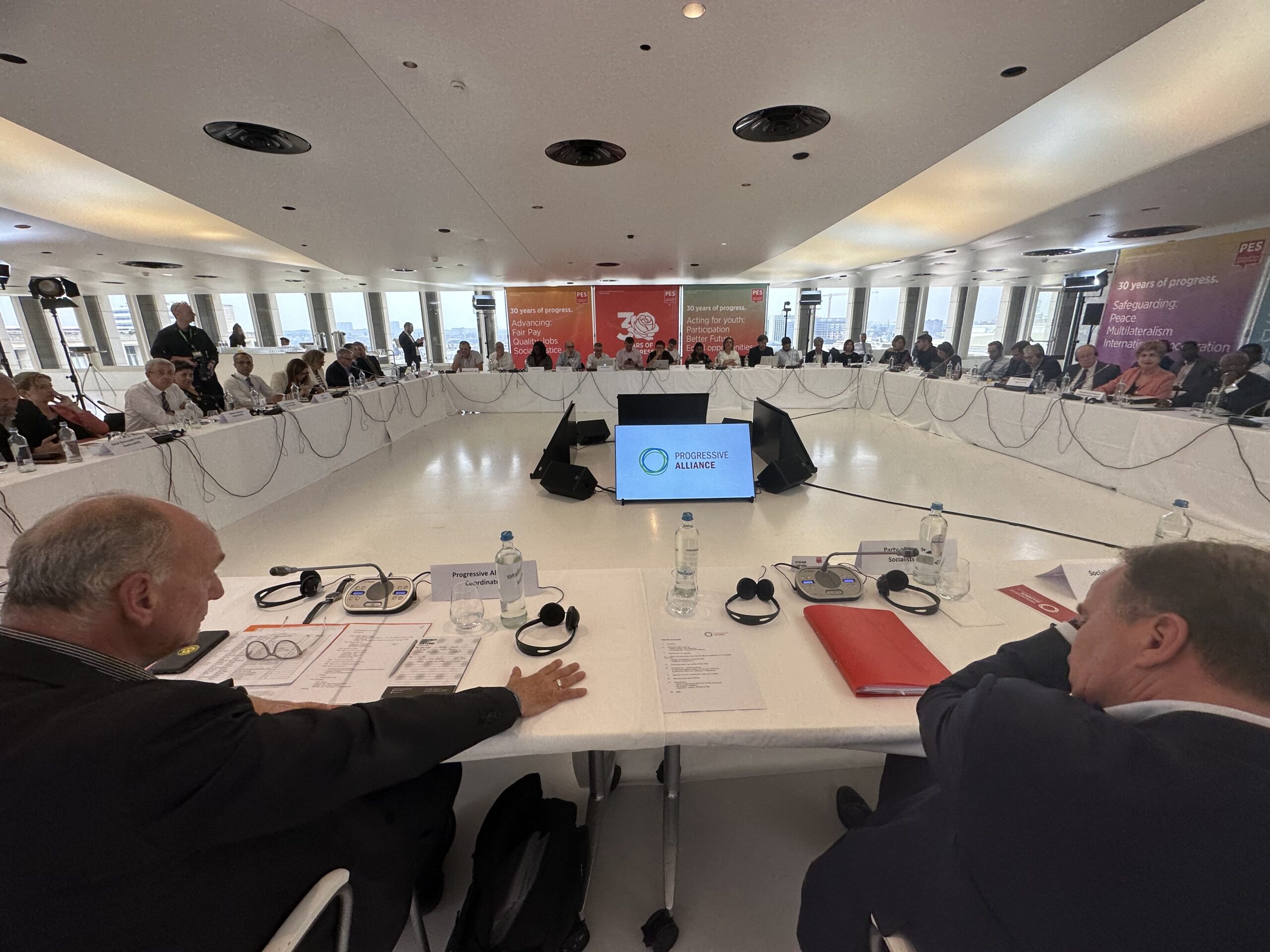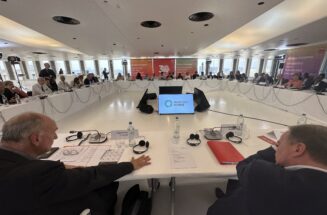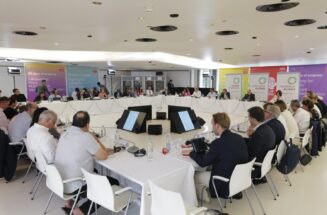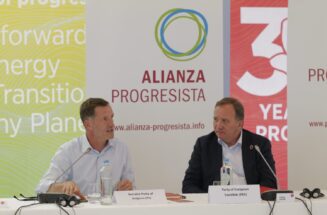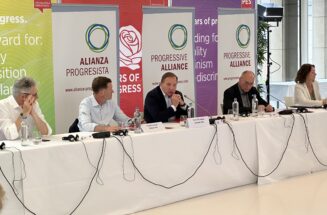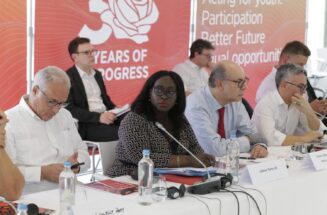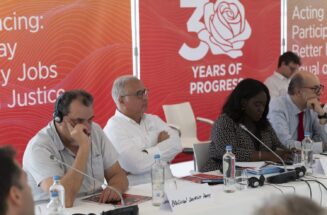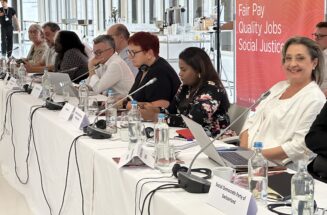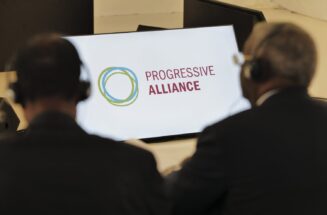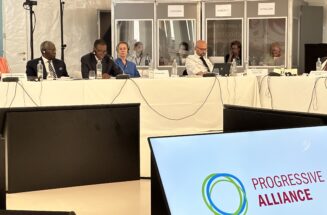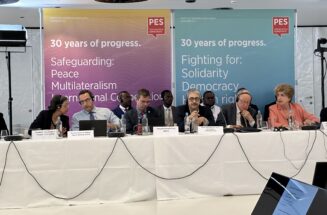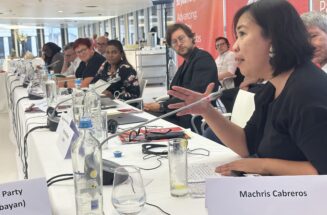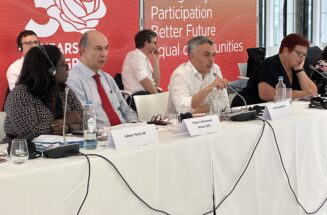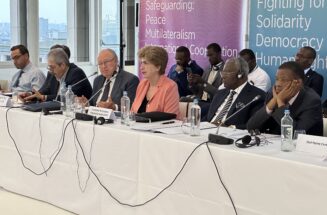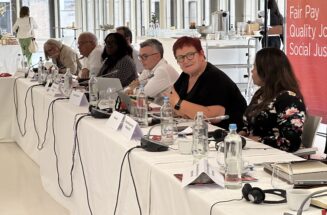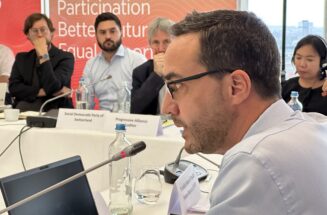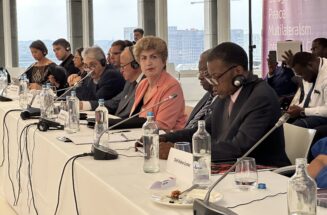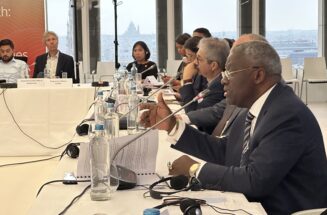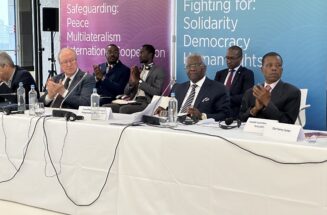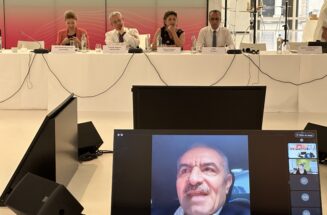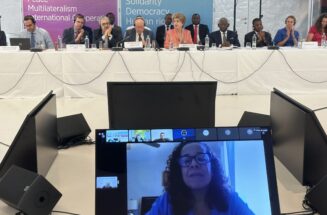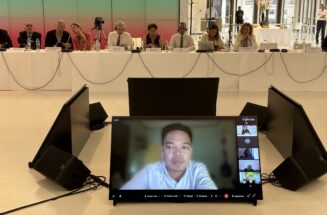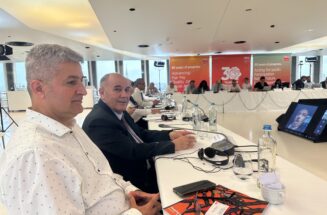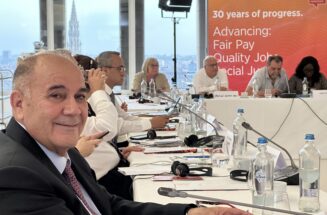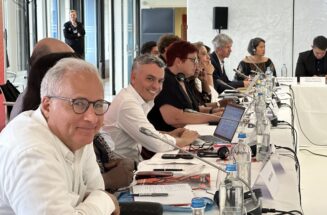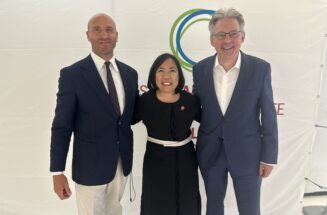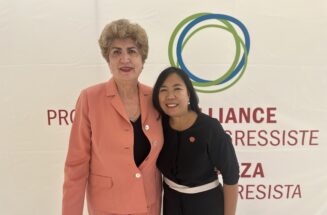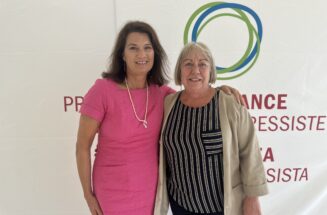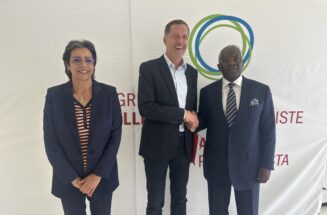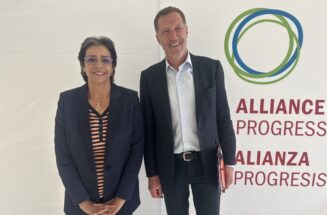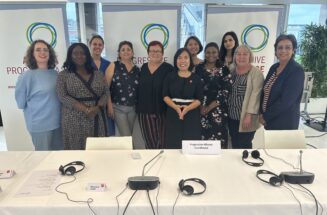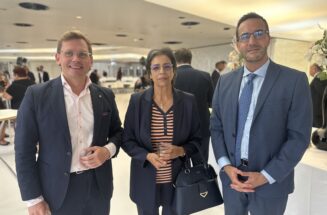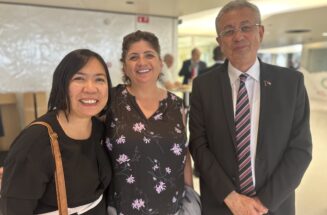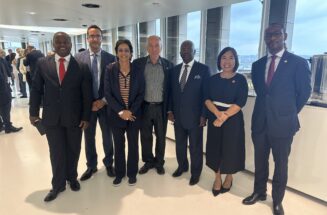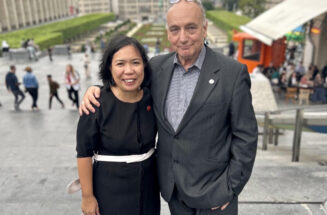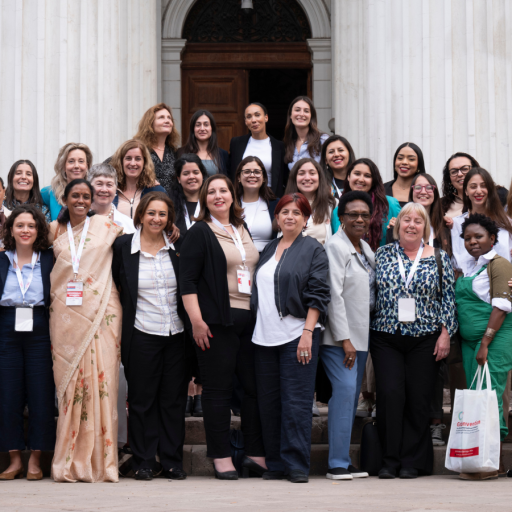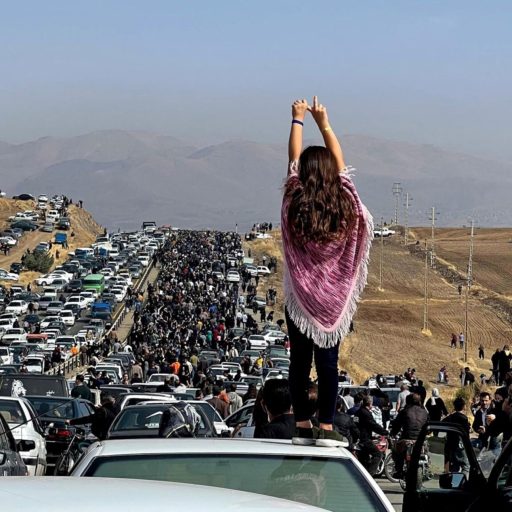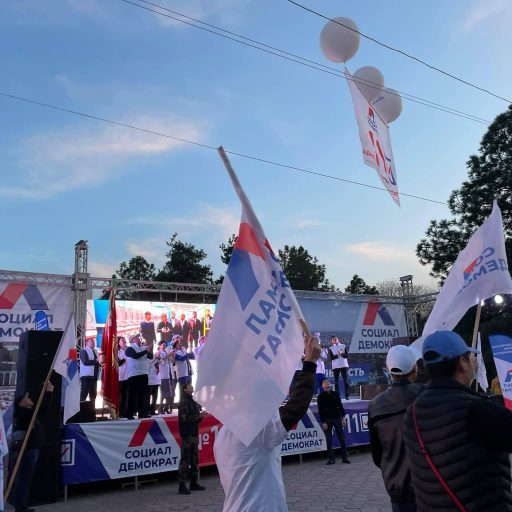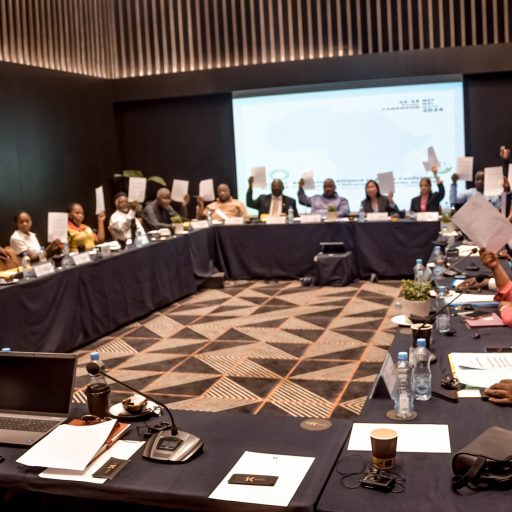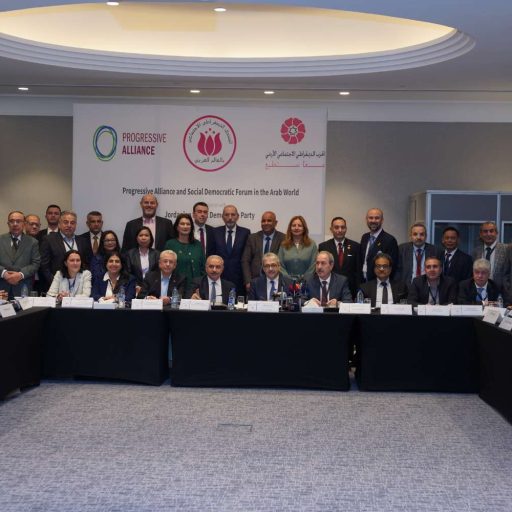Adopted during the Progressive Alliance Board Meeting (June 29, 2023, Brussels)
The world is facing unprecedented shifts, epochal changes in human history characterized by persisting crises in the economy, society and politics. Our world now faces multiple crises that are testing the viability of existing institutions and the normative understanding that global cooperation will improve the lives of billions of people.
We are facing an international and regional crisis in security. We are now a year into Russia’s invasion of Ukraine. While Russia’s war against Ukraine has disrupted the world’s agricultural-goods and energy supply chains to the detriment of the poorest communities in the world, more than 30 ongoing-armed conflicts in different continents remain to date. These unresolved conflicts and more prominently the recent threats on the use of nuclear weapons increasingly test the boundaries of the current international order. With persistent uncertainties on the question of sustainable peace, international security is at risk in an unprecedented way since the Cold War.
The climate crisis is aggravating. The latest Intergovernmental Panel on Climate Change report revealed that the impact and damage caused by climate change are more widespread and severe than expected in every region of the world. Such changes are nearing a point of no return and should the world cross such a threshold; the tremendous consequences will be borne by those who are the most vulnerable and who have contributed least to climate change.
The aftermath of the COVID pandemic has brought forth an era of greater insecurity. Inflation, economic insecurity, and the threat of pandemics loom large, causing a general sense of precariousness among the world’s population. The gap between the rich and the poor has widened, with the top billionaires’ combined wealth rising to record-high levels. The inequality within and between countries, was exacerbated by the impacts of the pandemic. This has raised questions once again on how the current economic order is organized.
We are also seeing a troubling phenomenon of democratic decline as experienced by many countries across the globe. The number of countries experiencing an overall decline was the highest in 17 years. The reported democratic decline was characterized by attacks on media freedom and free speech, democratic elections, corruption, and machinations of political institutions by authoritarian incumbents.
In the field of advancing gender justice, we are falling short of our goals. The recent Progress Report on the Sustainable Development Goals: “The Gender Snapshot 2022” indicates that we are not on track to reach the gender equality goals. Women’s sexual and reproductive health rights are under assault and violence against women remain high. Such trends risk obstructing our overall goals of creating equity in our societies and gender equality.
We are facing a watershed moment in international history. This pronouncement while being made in the aftermath and in reference to Russia’s invasion of Ukraine no doubt holds true for the multiple crises we face. It is the culmination of long running global trends that have been set in motion and that must be immediately addressed. Radical changes are occurring and our societies face the upheavals that we need to address. Social democracy has the experience and the tools to do this.
We have seen the larger family of social democrats and socialists in the Progressive Alliance and leftwing movements succeed with the election of Left governments in Latin America especially in Colombia, Brazil, Chile, and Bolivia, among others. Member-parties and leaders in Europe are in key positions to strengthen and unify the European Union. Our member-parties in different continents are showing progressive ways in governance and actively work on the grassroots and with organized civil society. These political developments provide meaningful opportunities for the global social democratic movement in terms of sharing knowledge, extending international solidarity, and offering alternative solutions to pressing cross-border global problems.
We now face a plethora of systemic problems, both old and new. Neoliberal capitalism is driving crises of inequality, hunger, diseases and at the same time pushes global climate elements to its tipping point. These old problems have persisted and passed down through decades due to insufficient political action. New problems and risks brought about by rapid digital transformations on jobs, data privacy, and cybersecurity, the emerging tensions over supply and distribution of raw materials, and the renewed use of force in international policy have surfaced and are particular to the current times.
Many analysts too have pointed that the states’ commitments and actions toward achieving the Sustainable Development Goals are lagging behind to meet the 2030 target. Given the current state of affairs at the national, regional and international level, a coordinated, coherent, and future-proof approach to solving the problems of our times is demanded if progressives are to turn things around for decades to come.
Building on previous Progressive Alliance working documents and resolutions on the Agenda for new, fair and inclusive multilateralism, Resilient Democracies, and our member parties’ proposals, this proposed international programme of the Progressive Alliance presented by its member parties and political leaders is a reconstruction and validation of its programmatic responses to common challenges facing the changing world today. It follows through our work as political stakeholders by setting standards, identifying departure points and benchmarks, laying out strategies, lending expertise, and sharing best practices.
Our analysis and perspective as social democrats see that such problems are intertwined and necessitate decisive action in the present so that future generations will no longer inherit the problems that these crises create. The old ways and methods of solving challenges are now insufficient. There are clear interconnections on the problems and solutions of the four policy pillars to be discussed. And, there are intertwined implications to the political choices and decisions we will take as regards these identified issues that can weaken or strengthen the other. Therefore there is a need to make our international programme coherent and future-proof to produce sustainable outcomes.
Clearly, the question posed to us social democrats is this: can we muster the political will and courage, mobilize support, and produce results from new and innovative solutions we will put forward in shaping a progressive future shared by all?
Our Tasks
In response to the persistent and emerging problems of our time, the Progressive Alliance should be able to provide renewed analysis of common problems today through the lens of its member parties and political figures. We recognize the defining issues of the 21st century – Inequality, Climate Change, Digitalization Gap, Democratic Erosion, and the Return of War as an instrument of foreign policy – all require bold, comprehensive and far-sighted responses. Our far-sighted programme should take account of the transformational challenges faced by peoples and the planet and put forth ambitious, realistic and practicable policies on the promotion of Peace and Security, Economic Governance, Sustainability, and a Democratic Agenda to Transform the 21st Century.
The Progressive Alliance must open the platform for dialogue that will generate discourse and strategies and build consensus among its members and allies including unions and civil society. It is our aim that with a clear understanding of the structural inadequacies, past missteps and motivations of political actors, this platform of dialogue will formulate solutions and initiate actions that can contribute to propelling our progressive agenda at the domestic, regional and global level. By outlining policy pillars of progressive politics in the 21st century – principled, visionary and realizable– we not only reaffirm our basic values but we also take concrete steps for impactful transnational, cross-border cooperation among progressives worldwide.Initial Key Points for Discussion
Peace and Security
We recognize the far-reaching consequences of the Russian invasion of Ukraine has not only destabilized energy systems and food systems. Russia’s invasion has cost lives, devastated communities and has brought the threat of use of nuclear weapons into the mainstream of geopolitics. This war has precipitated a humanitarian catastrophe killing hundreds of thousands of civilians and combatants and creating a global food crisis that has seen rising prices of food that is affecting millions especially in the Global South. This invasion is a clear violation of international law and the United Nations charter. Such violation of international law is made more alarming with how brazen it has been committed by no less than a permanent Security Council Member. The solutions to this conflict and others that are raging across the globe are indeed complicated and not evident. There are even differences even within the progressive community on the approaches and strategies to resolving these conflicts.
How do we reconstruct the UN Security Council and other UN Bodies that reinforces the shared values of its Charter and delivers action that impact members where and when needed?How do we reinforce commitments on disarmament and non-proliferation policies?
How do we promote and prioritize a feminist foreign policy among our countries that pushes for the advancement of collective interests by way of the protection of women and gender minorities rights, guaranteeing equal participation and equal representation of men and women in public affairs, and prioritizing diplomacy, human security and peacekeeping in international engagements and conflict resolution?
What is our approach to decolonizing foreign relations that safeguards sovereignty and reverses patriarchal, racial and unjust power relations?
Economic Order
Humanity is faced with the pressing challenge of creating a viable economic order built on principles that will make it possible to fairly distribute economic goods and fruits of economic activity to all. This entails building on current technological advancements and the reorientation of the world economy. The existing economic order if left unchecked will utilize new technologies for its own economic logic leading to exacerbation of poverty, underdevelopment, and marginalization.
The rise of artificial intelligence and the digitalization of industries in our societies must not serve to further place the working class into further precarity. Instead, the advances in technologies must serve to bring about greater economic empowerment, especially for those who are most marginalized under the prevailing neoliberal economic system.
The digitalization gap must be closed and regulations on AI must be put in place under the circumstances of its fast-pacing development. We must therefore pursue greater social involvement and insist on transparency and government restrictions on developing technologies to ensure that they are neither monopolized nor become tools for the further concentration of wealth and power. We must proactively work to put in place safeguards against risks to jobs and privacy.
Policies such as employment guarantees, progressive national and global tax regimes, fair global debt regimes, and peoples’ wider access to welfare should be clear targets in our progressive economic restructuring. Given the present economic order’s connection to other crises we are experiencing (climate, human rights, and democratic decline and reversals), we must push for the viability of a contrasting one: an economy that complies with the values of human rights, ecological sustainability and protection, and democratic participation.
Inequality and underdevelopment remain and persist because of corporate-led globalization with neoliberal paradigms still affecting the policies of regional development banks and the World Bank group. Greater concentration of wealth has occurred despite the economic, health, and social crises of the past few years. The inordinate influence of corporations and the elite on the management and running of our economic life has pushed human development to the fringes of economic growth and brought us to the limits of our planetary boundaries. Social democrats must push for institutionalizing a fairer and equitable economic governance at the national and global levels where social actors engage actively in determining the future of our societies.How do we redefine progressive development/economic policy that addresses the ever-increasing wealth concentration and social disparities?
How do we direct the development of new technologies such as AI and make them accessible to all so that they can be utilized to respond to gaps in education, health, employment, and other pressing problems? How do we regulate such technologies to transform it to a public good rather than a tool for exploitation?
How can we create a fiscal policy that centers on preventive social policy and full employment under progressive tax regimes as well as a sustainable and fair international debt regime? Specifically, how can we lead the charge for the creation of a corporate tax structure across the globe?
How do we effectively assert human rights, environmental protection, and democratic participation as standards and conditions to trade and supply chains?
Sustainability
Neoliberalism is among the root causes of the climate crisis. Any credible and effective solution to the climate crisis must address the economic roots of the crisis. The price of delay or inaction will condemn millions more to disaster. While that is the case, we are aware that the fundamental changes to our society and economy will adversely affect the livelihood of millions dependent on current unsustainable industries and energy systems especially in the Global South. Those who have less are at highest risk. The fundamental solutions we propose combine both the reorientation of our economic and energy systems toward sustainable growth and ecological protection where those who have more provide impetus that others can follow in mitigation and adaptation. Our actions for just transition ensure that communities and peoples are equal partners in achieving equitable growth and the communities that rely on polluting and destructive industries are able to adapt and integrate to a sustainable economy.
We are convinced of Climate Justice as a framework for energy security and just transition and reaffirm our commitment to the Paris Agreement. Clear results from agreed policies are being demanded from this generation. We are pressed to invest our finances, technologies, and political capital to realize the Global Green New Deal.How do we restructure the global economy towards sustainable use of natural resources, protection of biodiversity, reduction of pollution, change in production and consumption patterns, and the overall reduction of human impact on the planetary boundaries to meet the global net zero target by 2050?
How do we empower and complement the growing climate justice movements, ensure the participation of marginalized communities and workers in development through just transition, and mobilize cross-generational support to achieve concrete victories in the fight against the climate crisis?
How do we ensure the success of the historic Loss and damage fund won in COP27 to ensure that the fund is capitalized by developed countries so communities severely affected by the climate crisis can rebuild and recover, as a measure of climate justice?
How can we effectively promote within the discourse of economic governance and sustainability a program for Just Ecological Transition amid the growing battle for resources as resources grow scarcer and people are further displaced?
How do we build international legal mechanisms that will hold extractive and polluting industries and corporations accountable for their role in the climate crisis and follow through the recent UN General Assembly resolution seeking the International Court of Justice to clarify the legal obligations of countries to address climate change?
Democracy
Social democrats and progressive forces are at a crossroads between further backsliding of democracy or a new wave of democratic renewal. A new transformative democratic project must be created to meet the challenges of authoritarianism and respond to the inadequacies of liberal democracy. Only when democracy can guarantee individual freedoms and collective prosperity can this new democratic project be able to withstand the attacks of autocrats, demagogues, and populists. We must be able to rearticulate at this age that only under democracy that social progress can be realized and that only in democracy that stability can be sustained.
The case for democrats to bridge polarization and combat political extremism, especially the threat of the populist and far-right, require that democratic institutions can work in responding to the social and economic problems that exacerbate uncertainties experienced by peoples and their communities. As in the case of individual states, global governance instruments’ democratic legitimacy and rules-based order are being challenged by anti-democratic forces, hampering needed collaboration and urgent responses to international issues.
The trends of consecutive democratic decline must be reversed. The hijacking of democratic reforms and norms is a threat to our agenda of overcoming crises. For democracies to be resilient, we must work for continuing people’s participation in public affairs. Open, transparent, and participatory platforms and mechanisms allow for power reorientation based on inclusion that should close the gap between the elites and the marginalized within countries, and between developed and developing countries’ voice in the international arena. We must promote the rule of law and accountability that safeguard freedoms and civil liberties and protect civic space by guaranteeing human rights, access to information, and access to justice.How do we harmonize strategies to strengthen political legitimacy of global governance institutions? What are the reforms we must introduce to build trust and cooperation?
How do we strengthen our global governance work in the context of the promotion of the Sustainable Development Goals (SDGs)
How do we strengthen and emphasize our fight against the rising tide of populism and far-right politics especially in the context of deepening inequality, growing threat of racism and xenophobia, as well as the growing strength of authoritarian structures and populist rhetoric?
What is our model of strengthened multilateralism that show the way in delivering targets on our shared goals for humanity and the planet?
What norms do we set together with democratic movements for democracies to withstand autocratic pressures and prevent reversals of democratic gains?
How do we govern online platforms and social media as democratic spaces where people are safe from exploitation of their data by companies, from disinformation, and from censorship by governments?
Transforming the 21st Century
It is no longer in doubt that we are seeing a multipolar world taking shape. The United States’ dominant position in the world is being challenged by ascendant global powers. Old strategic partnerships are seeing strains and new regional and global alliances are being formed. It is in this dynamic context that we are seeing undemocratic forces taking advantage of new spaces for their politics brought about by the apprehension and distrust with the West’s political project. We must be vigilant that this multipolarity of fragmentation or polarization does not become the global norm. It is critical that as this new order takes shape, democratic movements and progressives must also actively engage and build its forces and alliances to shape its direction towards a multilateral future characterized by cooperation around internationally accepted values and guard against new threats to global security, continued erosion of trust and polarization, and isolationist or nationalistic outlook to global affairs.
The complexities of problems warrant us to delicately handle relations with forces at different levels. It is high time that we revisit our terms of engagement with democracies in decline, chart constructive relations with political forces in the different regions of the world, and answer hard questions relating to the developments in and around China, BRICS and the Arab region. We need to be mindful of emerging powers offering alternative alliances to other countries and regions.
We propose a balanced, global democratic cooperation for progress, stability and sustainability to be built upon fairness, trust, collaboration and directed towards solving the defining issues of our time. We want to make our political community of progressives appealing, reliable and establish equal partnership on concrete international initiatives on the economy, climate, health, social protection, peace and democracy. Our alternatives must reflect that change is not only to be aspired for but to be actualized. Our best practices must attest to the viability of our ideas. We therefore have to contribute to political leadership and build strategic partnerships at the global level and across different regions. As vital democratic institutions, our political parties must closely work together to propel a cross-border, intersectional and intergenerational agenda of transformation.
We aim for societal consensus to de-escalate tensions, mend social fractures, and ultimately create lasting solutions to societal problems. Our collective responses, forged with broad ranks in society as represented by unions and civil society, should not only fit for the future but also can immediately impact on the needs of the present.
We will build upon the solidarity of our parties and peoples with those who work on the ground to combat inequality, authoritarianism, violence and exclusion. By positioning ourselves to strongly influence the creation of alternatives, we build a renewed case for global social democracy.
Mandate by the Progressive Alliance Board:
- The Progressive Alliance (PA) will presents its member parties and political leaders’ programmatic responses to common challenges facing the changing world today by building up on its collective work over the years to set standards, identify departure points and benchmarks, lay out strategies, and share best practices;
- The PA’s international programme will cover the interconnected transformational challenges that require coordinated, coherent and future-proof global solutions: combatting Inequality, action on Climate Change, battling populism and far-right politics, answering the Digitalization Gap, reversing Democratic Erosion, and fighting the Return of War as an instrument in foreign policy;
- The PA’s international programme will put forth ambitious, realistic and practicable policies on the promotion of Fair Economic Governance, Sustainability, Democratic Agenda, Peace and Security, and Feminist Foreign and Development Policy, and Renewed Global Cooperation;
- The PA will open platforms for dialogue that will generate discourse and build consensus among its members and allies including unions and civil society, and initiate taking concrete steps for impactful, cross-border cooperation among progressives across the globe;
- The PA will form a working group, draw the implementation plan for this international politics programme, allocate resources, and conduct activities to realize these objectives and that progress and final reports be submitted to the Steering Committee.
- The PA will be strengthened as a global platform for cooperation and oversee revitalization and expansion efforts especially in the Global South.
